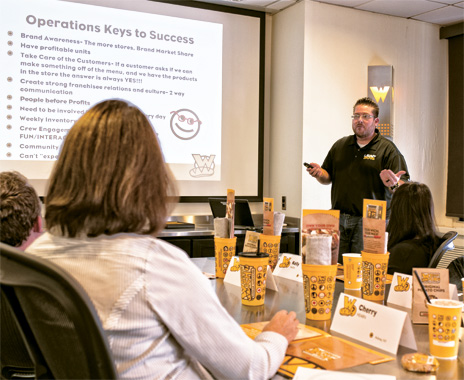Confetti rains down on potential Which Wich franchisees while internal team members sing and offer rounds of high-fives. In Idaho, a potential franchisee rolls up his sleeves and takes orders at Pita Pit’s flagship in the U.S. In Tampa, Florida, candidates sit across the table from Checkers/Rally’s CEO Rick Silva and learn how he thinks of franchisees as a family.
These are some of the exercises that occur during Discovery Days—a day when franchisee candidates come to corporate headquarters to learn about the company and meet the internal team. “It’s my favorite day … and probably the most important day in our relationship,” Silva says. “It sets the tone for our relationship.”
Discovery Days are conducted in a variety of ways. Some brands hold a separate day for each candidate, while others bring several groups of candidates to one event. Some brands hold Discovery Days early in the franchising process, and others are held only after the candidates have been thoroughly vetted and interviewed. No matter how they’re conducted, Discovery Days are a fundamental part of the franchising process, and they should fulfill some basic goals.
Tom Ferguson, CEO of the better-breakfast franchise Rise Biscuits & Donuts in Durham, North Carolina, likens the process to interviewing a babysitter, while Silva compares it to having open and honest talks before entering a marriage.
Lynette McKee, CEO of franchise consulting firm Mc-KeeCo Services, says Discovery Days are an opportunity for candidates to evaluate the company. It lets them determine if they are comfortable with the leadership, with the way the company presents itself, and with the company’s operating systems. It also gives candidates the confidence that other franchisees will have been vetted well.
Corey Bowman, president of Pita Pit, believes the most important thing is learning if expectations between franchisor and candidate align. “If you don’t match the expectations, there’s a gap there called disappointment. That’s what you want to avoid,” Bowman says.
Discovery Days often follow a basic trajectory. McKee recommends beginning with an informal coffee session to break the ice, followed by a C-suite meeting in which the CEO talks about the brand, leadership’s expectations, and the company’s future. After that, the candidate should talk about him or herself, perhaps showing slides or a business plan. If a brand restaurant is nearby, the candidate is taken there for lunch. The rest of the day is broken up into meetings with the marketing, operations, IT, R&D, real estate, and franchise administration teams, McKee says.
Throughout the day, candidates and internal staff are encouraged to ask questions. That’s important to ensuring a good fit, which Bowman says is only possible through complete honesty about the good, the bad, and the ugly.
Ferguson has discovered the importance of giving candidates a thorough tour of the restaurant kitchens. Rise makes its biscuits and doughnuts in-house, and it’s an involved process. “They get to see if they can handle it or if they think it’s too complicated for them,” he says. It’s an example of how “we’re really transparent and upfront. … They’re getting a lot of stuff from us as franchise owners.”
Pita Pit similarly ensures that candidates acquire an accurate understanding of operations. Franchisees are hands-on at Pita Pit, so candidates without restaurant experience often work a shift at the flagship store during Discovery Day. Getting down and dirty, taking orders, and rolling sandwiches helps set accurate expectations, Bowman says.
For Which Wich, determining culture fit is critical. The Dallas-based brand creates a party-like atmosphere with confetti cannons, music, and lots of cheering in order to emphasize the company’s fun, positive core values. “We talk so much about vibes and positive energy in our restaurants, and it really starts here,” says Hala Habal, vice president of communications. Everyone joins in the bimonthly “Leap Day,” from the receptionist to the executives, to convey a sense of team spirit. Candidates’ participation in Leap Day offers “a great way to tell if people are really, truly going to live it, bring it, and have the same core values,” Habal adds.
Although McKee says the most effective Discovery Days are held one on one, candidates can still get individual attention at group events. Checkers/Rally’s holds monthly Candidate Days that usually include four or five candidate groups who eat dinner together and attend a morning huddle. Still, C-suite and team meetings are conducted individually. Group Candidate Days fit with the brand’s emphasis on being a family and bonding, Silva says.
No matter how the Discovery Day is structured, it’s important for the leadership to attend, McKee says, though she acknowledges that for some large franchises it might be impossible. In that case, someone like the regional vice president of operations should assume responsibility.
“The sales people are talking about Discovery Day and the need for it from the beginning, saying it’s something we take very seriously,” Bowman says. “When you have the executive team show up, it validates that. It’s not just something we say; it’s something we mean.”
C-suite meetings also show candidates that the executives as real people, which is critical for Checkers/Rally’s. The Tampa-based brand puts a tremendous emphasis on the personal relationship between franchisor and franchisee; the executive team approves restaurant locations, conducts quarterly all-franchisee calls, and gives each franchisee their personal cell numbers. Candidate Day sets the precedent for that relationship.
Being asked tough questions during the intimate C-suite meeting lets candidates know the level of engagement they can expect, Silva says. Some candidates like that involvement. Others meet the team and say, “‘Wow, these guys are way too intense,’” Silva says with a laugh. “But that’s OK. That’s why we do Candidate Days.”
After a Discovery Day, the various teams discuss their impressions. The candidates should receive a response in 48–72 hours to know if they’re not a good fit, if the franchise sales person needs to continue working with them, or if they are approved, McKee says.
“And once they become a franchisee,” Silva says, “the real exciting work begins.”









